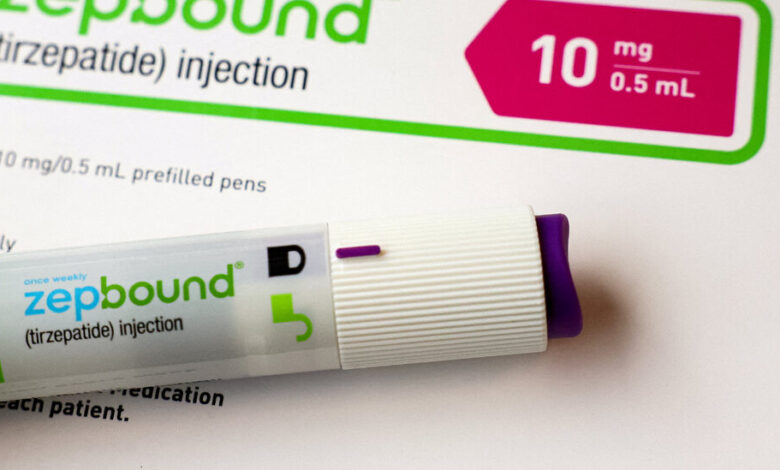Users of Zepbound or Mounjaro Had Lower Blood Pressure in Study

A study of the weight loss drug tirzepatide showed that people who took it had significantly lower blood pressures after 36 weeks of using the medication.
Tirzepatide, made by Eli Lilly, is used to treat Type 2 diabetes, under the brand name Mounjaro, and to treat obesity, under the brand name Zepbound. It is the latest among a new class of weight loss drugs, and its chief competitor is semaglutide, made by Novo Nordisk and sold as Ozempic for diabetes and as Wegovy for weight loss. For both drugs, researchers have been assessing whether they have additional effects that go beyond weight loss.
The blood pressure study, supported by Eli Lilly and published on Monday in the journal Hypertension, was part of a larger effort to assess tirzepatide’s effects on weight loss. Researchers had already found that people who took the drug had lower blood pressures when readings were taken in a doctor’s office. The new study applied a more rigorous criteria: Did participants taking the drug have lower pressures when measured with a 24-hour monitor?
They did. Those taking the drug had systolic blood pressures — the pressure on blood vessels when the heart contracts — that were from 7.4 to 10.0 milligrams of mercury lower than those of participants taking a placebo. Systolic pressure is believed to be an accurate predictor of heart disease risk.
The blood pressure reduction, said Dr. James de Lemos, a cardiologist at the University of Texas Southwestern Medical Center and the lead author of the study, is about what would be expected with a full dose of a blood pressure medicine. As such, he said, the drug can be useful for people trying to control their pressure and reduce their heart attack and stroke risk (although the study does not suggest tirzepatide be substituted for other blood pressure medications).
But, he noted, it was not possible to distinguish the effect — if any — that the drug had on blood pressure from the well-known effect that weight loss has on reducing blood pressure.
Dr. Benjamin Ansell, a blood pressure specialist at the University of California, Los Angeles, who was not involved in the study, said that he did not find the result surprising.
”One could also hypothesize that weight loss permitted more exercise or improved sleep/reduced sleep apnea, any of which could ‘additionally’ lower blood pressure,” he wrote in an email.
A more interesting effect of a drug in this class, Dr. Ansell noted, is the recent discovery that semaglutide helps patients with a condition known as heart failure with preserved ejection fraction — a common outcome of obesity and high blood pressure. It is a chronic and progressive disease that is debilitating and destroys quality of life. Most patients with this sort of heart failure have obesity, and obesity is thought to contribute to the disease and its progression.
In a large study by Novo Nordisk, patients taking semaglutide had fewer symptoms of the disease and were better able to exercise, researchers found.
That result, Dr. Ansell added, “showed a profound clinical significance in improving their function while reducing hospitalizations.”
And that finding adds to another Novo Nordisk result showing that semaglutide reduced the risk of cardiac events like heart attacks.
Source link



